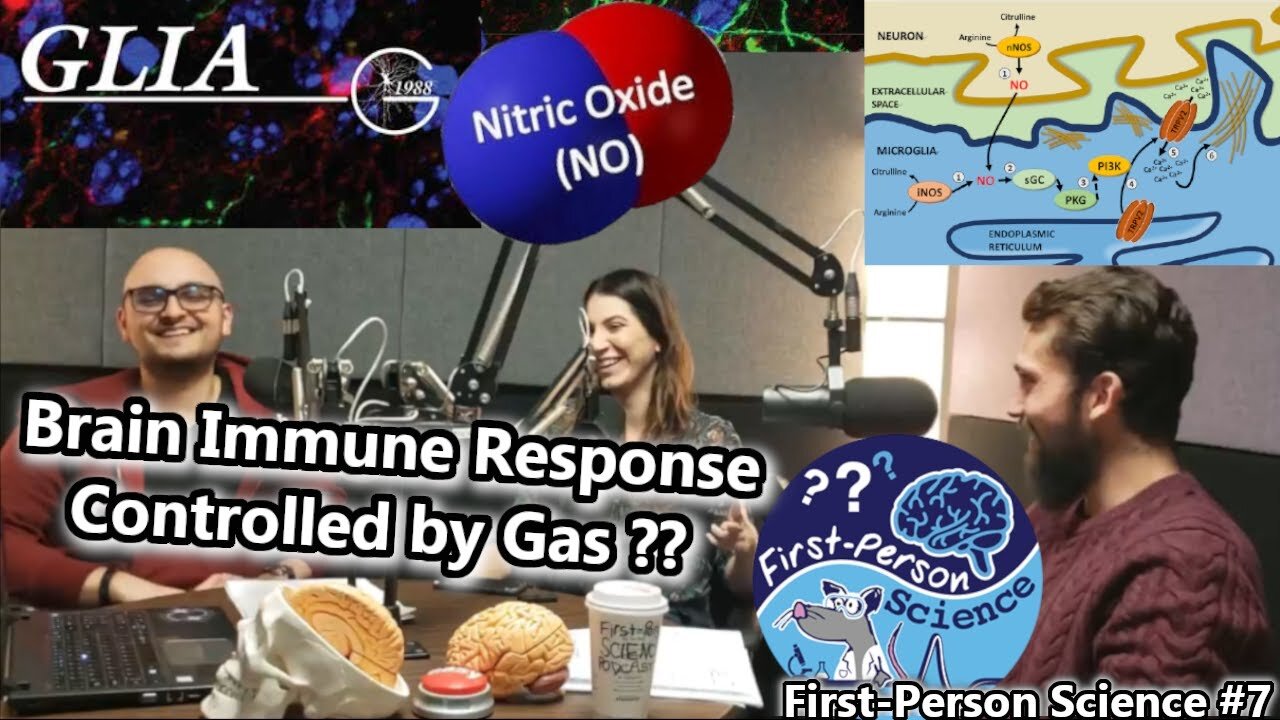Premium Only Content

Microglial Phagocytosis & Brain Inflammation Are Controlled By Nitric Oxide & TRPV2 | FPS#7
In this episode, we discuss the mechanisms that regulate microglia phagocytosis (such as TRPV2 and other vanilloid receptors) - AKA eating apoptosis ready cells - and how the brain maintains healthy function in aging and after injury, such as traumatic brain injury (TBI).Because neurons get all the attention, you don't hear too much about glia. Although glia cells DO NOT carry nerve impulses (action potentials) they do have many important functions. In fact, without glia, the neurons would not work properly! Neuroscience PhD Candidates Matthew Maksoud and Viki Tellios join us to speak on their article - Nitric Oxide Upregulates microglia phagocytosis and increases transient receptor potential vanilloid type 2 channel expression on the plasma membrane - published in the journal Glia: https://onlinelibrary.wiley.com/doi/full/10.1002/glia.23685
Abstract
Microglia phagocytosis is critical for central nervous system development, and dysregulation of phagocytosis may contribute to a variety of neurological disorders. During initial stages of phagocytosis, microglia display increased nitric oxide (NO) production via inducible nitric oxide synthase (iNOS) activity and amplified calcium entry through transient receptor potential vanilloid type 2 (TRPV2) channels. The present study investigated the regulatory role of iNOS/NO signaling in microglial phagocytosis and TRPV2 channel activation using phagocytosis assay, calcium imaging, patch clamp electrophysiology, immunocytochemistry, and immunoblot assays. Results showed that primary microglia from iNOS‐knockout (iNOS−/−) mice exhibited substantial deficits in phagocytic capacity and TRPV2 channel activity relative to wild‐type (WT) controls. Specifically, iNOS−/− microglia displayed a lower level of TRPV2 protein localized on the plasma membrane (PM) without any significant change in the mRNA levels of Fc‐gamma receptors and TRPV2. In addition, iNOS−/− microglia, unlike their WT controls, failed to elicit a calcium influx in response to application of the TRPV2‐agonist 2‐aminoethoxydiphenyl borate (2APB). Importantly, the phagocytic capacity and the PM expression and activity of TRPV2 in iNOS−/− microglia were largely corrected by pretreatment with NO‐donors. Accordingly, the 2APB‐evoked calcium influx and the PM expression of TRPV2 in WT microglia were significantly decreased by selective inhibition of iNOS, protein kinase‐G (PKG), or phosphoinositide‐3‐kinase (PI3K), respectively. Together, results from this study indicated that iNOS/NO signaling upregulates microglial phagocytosis and increases TRPV2 trafficking to the PM via PKG/PI3K dependent pathway(s) and vanilloid receptors.
Use Filmora To Create Great Quality Videos - 20% off Link: http://tiny.cc/b86pkz
___________________________________________________________________________________
Interested in cutting-edge neuroscience research? Tired of exciting information being hidden behind those pesky paywalls? Introducing the First-Person Science Podcast: The 1st and only podcast dedicated to in-depth exploration of neuroscience research articles with first-hand perspectives and narratives from the authors themselves.
FPS introduces a new way to discover and engage with neuroscience research. We aim to break-down barriers to science communication by explaining jargon and complicated concepts in entertaining and succinct ways in a 'journal club' style to encourage collaboration and discussion between scientists and the public, alike.
In each episode, a scientist joins the show to speak about their recent 'first-author' manuscript. We walk viewers through each figure "1 bar graph at a time" using panel-to-panel summaries with video and visual illustrations to aid understanding of complex topics.
Listeners can expect to learn cool facts and get a general background for everything related to the episode's journal article through a visually immersive 'journal club' approach to the podcast, Ft. narratives and first-person perspectives from the authors/scientists themselves. It's a fine line to manage, but we're doing our best! And the more feedback from people from all levels of background/understanding, the better!
Listen to our podcast on itunes, spotify, or wherever you get your podcasts. Direct audio download link: https://firstpersonscience.podbean.com
RSS Feed: https://feed.podbean.com/firstpersons...
Follow us on Twitter to stay up to date on the latest research: @firstpersonsci
Facebook: https://www.facebook.com/First-Person...
Instagram: https://www.instagram.com/firstperson...
Interested in increasing exposure for your published research? Curious about becoming involved with the show? Email us: firstpersonsciencepod@gmail.com
-
 LIVE
LIVE
Badlands Media
7 hours agoBadlands Daily: August 26, 2025
2,501 watching -
 LIVE
LIVE
Dear America
2 hours agoNO MORE BURNING FLAGS!! 🇺🇸 Trump Signs Order Making It ILLEGAL!! + Trump Is SUING NEWSOM!
4,521 watching -
 LIVE
LIVE
Law&Crime
1 hour agoLIVE: Adelson Matriarch Murder Trial — FL v. Donna Adelson — Day 3
223 watching -
 LIVE
LIVE
Major League Fishing
4 days agoLIVE! - Fishing Clash Team Series: Challenge Cup - Day 3
222 watching -
 27:39
27:39
Crypto.com
49 minutes ago2025 Live AMA with Kris Marszalek, Co-Founder & CEO of Crypto.com
-
 LIVE
LIVE
JuicyJohns
2 hours ago $0.23 earned🟢#1 REBIRTH PLAYER 10.2+ KD🟢
105 watching -
 LIVE
LIVE
Surviving The Survivor: #BestGuests in True Crime
1 hour agoCourt Stream: Donna Adelson Trial DAY 3 of Testimony
62 watching -
 LIVE
LIVE
Wendy Bell Radio
5 hours agoWhat Hill Will Democrats Choose To Die On?
8,066 watching -
 LIVE
LIVE
LFA TV
4 hours agoLFA TV ALL DAY STREAM - TUESDAY 8/26/25
5,363 watching -
 1:15:15
1:15:15
JULIE GREEN MINISTRIES
3 hours agoTHE CIA HAS BEEN A GIANT IN THIS LAND THAT WILL BE TAKEN OUT
67.7K127